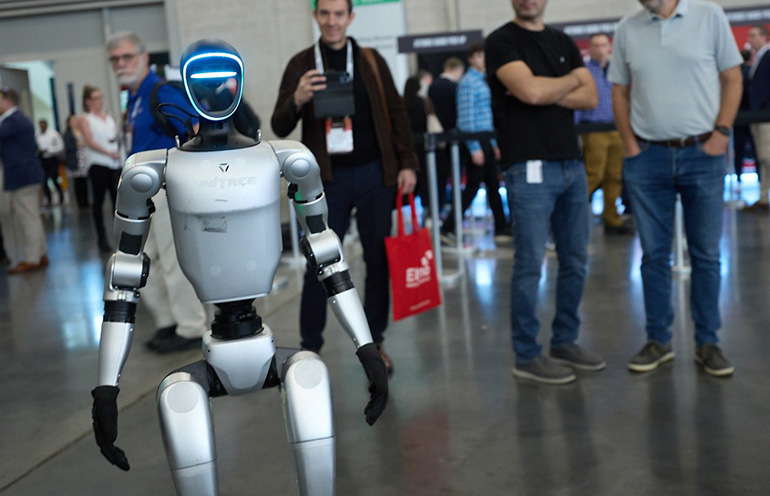
The Unitree G1 humanoid at last month’s Robotics Summit & Expo. Source: WTWH Media
Advances in robotic locomotion have led to increased interest in quadrupeds and humanoids. YuShu Technology Co., which does business as Unitree Robotics, last week reportedly raised an unspecified amount of Series C funding, bringing its valuation to about 12 billion yuan, or $1.7 billion U.S.
The Hangzhou, China-based company has grown from one person in 2016 to more than 1,000 employees, noted Wang Xingxing, founder and CEO of Unitree Robotics, at the 2025 Summer Davos Forum in Tianjin, China. Unitree also claimed that it has reached 1 billion yuan ($140 million) in annual revenue.
Wang acknowledged that large-scale deployments of legged robots have yet to occur, but he asserted that technology development and continuous improvement must align with market demand, according to Tech In Asia. Wang also said that Unitree expects increasing competition in the legged robot market.
Unitree focuses on affordable robots
Unitree’s robots are known for being up to 50% cheaper than other systems, starting at $16,000. They have found traction in the education, research and development, and facilities inspection markets.
In May 2025, Unitree demonstrated the G1 humanoid at the Robotics Summit & Expo in Boston, and its robots participated in their first boxing match. It has described the H1 system as its “first universal humanoid robot,” with continuous over-the-air (OTA) software updates.
In addition to its quadruped robots, Unitree has developed the Go-2-W, which combines four legs with wheels to operate in more terrain types. The company also sells the Z1 robotic arms and the L2 4D lidar scanners, as well as components and services.
Unlike many other humanoids, Unitree’s systems are already available for purchase. Wang said that artificial intelligence will help Unitree’s humanoids and quadrupeds learn new behaviors for widening use cases across industries.
Investors still bullish on humanoids
China Mobile’s fund, Tencent, Alibaba, Ant Group, Geely Capital, HongShan Capital, and Jinqiu Capital led Unitree’s Series C round, said the company. Existing shareholders also participated, and reports credited Unitree’s dancing robots at China’s Spring Festival Gala for stimulating investor interest. Some estimates put the round at $97.6 million.
“Our ultimate goal is to have AI-powered robots take on arduous work for humans, but before that’s achievable, participating in performances allows us to showcase real technological progress and generate some commercial value,” said Wang earlier this month.
Unitree could use the funding to further expand production and refine its software, wrote Late Post. The company also plans to target the consumer and household markets.
As with estimates of when humanoids might come to market and in what numbers, forecasts of the size of the humanoid robot market vary widely. That total market could exceed $5 trillion by 2030, predicted Morgan Stanley. Others are more skeptical; The Research Insights said the market could reach $4 billion by 2030.
While Tesla CEO Elon Musk has said that the Optimus humanoid will make Tesla a “25 trillion company,” Milan Kovac, its head of Optimus development, announced this month that he is leaving to “spend more time with family abroad.”
The post Unitree becomes a legged robot unicorn with Series C funding appeared first on The Robot Report.

